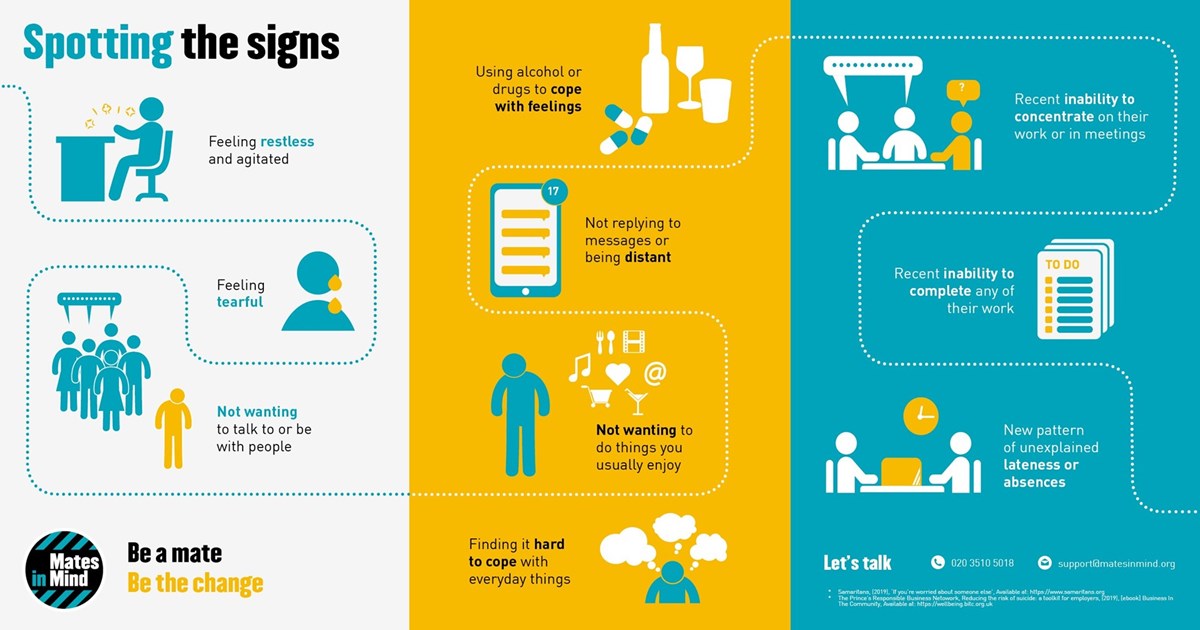Mental health in and through work
Mental health in the workplace is a legal requirement. Under the Health and Safety at Work Act 1974, The Equalities Act 2010 and Protection from Harassment Act 1997, employers have a duty of care to ensure the health, safety and wellbeing of their employees, including mental health/stress, and to protect employees with mental ill-health against discrimination and harassment.
Mental ill-health has a significant impact on individuals and their families, friends and colleagues, as well as employers, as the following statistics demonstrate:
- 1 in 4 people experience a diagnosable mental illness in a given year.
- Stress, depression or anxiety accounted for 49% of work-related ill health and 54% of all working days lost due to ill health in 2022/23.
- Over half of UK employees do not feel comfortable disclosing mental health or psychological conditions.
- It has been estimated that poor mental health costs UK employers approximately £56 billion a year because of sickness absence, presenteeism, and increased staff turnover.
- The Chartered Institute of Professional Development estimates that the median cost of recruiting employees is £1,500, and senior managers is £3,000 (2022).
- Analysis shows that employers that proactively invest in mental health support for their workforce can make significant gains, with an average £5 return for every £1 spent on wellbeing support.
What is mental health?
“Mental health is a state of mental well-being that enables people to cope with the stresses of life, realize their abilities, learn well and work well, and contribute to their community. It is an integral component of health and well-being that underpins our individual and collective abilities to make decisions, build relationships and shape the world we live in. Mental health is a basic human right. And it is crucial to personal, community and socio-economic development.” - The World Health Organisation
It is worth noting that mental health is specific to each person, and it is never static. We continually move along various points on a scale between good and poor mental health.
Causes of mental ill health
What causes mental ill health also varies from person to person. It could be one, or a combination, of the following: health (your own, or someone close to you), family (children, caring duties, being away from home, bereavement), relationship, financial, social, environmental or a hundred other factors.
Focusing specifically on work pressures, according to the HSE Management Standards there are six examples of work-related stressors:
- Demands - your workload and how challenging it is for you.
- Control - how much control you have over how, when and where you do your work.
- Support – how much help you get to do your job (when required) and how much training is provided.
- Role – whether the job is right, whether you want to do it, and if you can do it.
- Relationships – how you get on with your colleagues, including your line manager, and how well you work together.
- Change – how much notice you receive about upcoming changes and whether or not you agree with them.
Spotting the signs
Again, we are all different, but the infographic below shows some of the most common signs that you, a colleague, friend or family member may need support for their mental health (you can download this free poster here).

Building positive mental health in and through work
At Mates in Mind we focus on working collaboratively with organisations (because like us they are all individual - different sizes, specialities, with their own culture, way of working, provision for mental health and wellbeing), supporting them to create and embed positive mental health in and through work – because work and home lives are irrevocably interrelated.
This is why we recommend a ‘Mates’ approach:
- Management buy in is an essential first step to ensure mental wellbeing is made an integral part of every part of the organisation.
- Assess where you are and identify any gaps in provision.
- Targets – look at your vision for where you want to be and plan how you will achieve this.
- Educate the whole workforce not just a few members of staff, in order to create a peer support network.
- Support – provide relevant provision to enable employees, supply chains and contractors to access the support they need, when they need it.
In addition, in order for your strategy to succeed it is important to also:
- Communicate - provide your workforce with relevant, timely and accessible communication materials, demonstrate that you have an open and supportive culture which will help to address the stigma of mental health and enables conversations to start.
- Progress – repeat the above stages at least every two years to establish where you are now, to demonstrate distance travelled, and also to identify new targets going forward.
Next steps
At Mates in Mind we have worked with over 700 organisations across the construction, transport and logistics, fire and security, manufacturing and agriculture sectors. We encourage everyone in our community to engage with tailored training for employees, managers and mental health champions; helping everyone understand their roles and responsibilities when it comes to mental wellbeing at work.
If you would like to discover more about how to optimise your mental wellbeing, please read our blog series here
You can also find out more about how we work collaboratively with organisations to build positive mental health in and through work here
